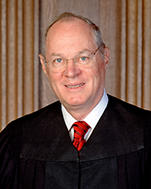With yesterday’s announcement that 81-year old Justice Anthony Kennedy would be retiring from the United States Supreme Court effective July 31, both sides of the respective political aisle went, for lack of a better term, nuts.
For the conservative side, Kennedy’s retirement means the opportunity for President Trump to nominate another solidly-conservative justice to the Supreme Court. That would give the conservative view -at least at first blush- a solid 5-4 majority on the high court.

With the announcement of his resignation, Associate Supreme Court Justice Anthony Kennedy, 81, has turned Washington on its head -and may have changed the outlook for midterm elections in key states. SCOTUS image.
|
From the liberal viewpoint -at least from what I can interpret from the hysterical shrieks- Kennedy’s retirement is, at a minimum, the end of western civilization. Others feel there’s no doubt that the universe will simply close down and we’ll simply cease to exist.
As is the case in most issues, the truth isn’t going to be found at either end of the extreme.
Roe v. Wade will not instantly disappear, neither will same-sex marriage, or the threats to the Second Amendment of the Constitution of the United States. And I’m not proffering that position because I’m calling for calm in a period of near-irrationality. My position is couched in the simple fact that once a Supreme Court Justice is sworn into office, they ultimately owe no loyalty to anyone, including the President who nominates them.
Justice Kennedy, the so-called “swing vote” (a description I’m told he despises), was nominated by Ronald Reagan. He was nominated because his background (solid Catholic upbringing, good family. solid record on the lower courts) indicated he would be a good judge who would rule based on the law, not on his personal positions.
He’s the longest sitting Supreme Court Justice, having been in his seat since February 18, 1988. During that time, Kennedy has joined the majority opinion on many split cases- on both sides of the ledger. He’s vote has formed the majority in opinions ranging from Heller to Obergfell v. Hodges, the 2015 case that legalized gay marriage.
He’s probably the best example - at least in my lifetime- of a Supreme Court Justice who tried to decide cases on merit, not ideology. Early in his service, he and Justice Sandra Day O’Connor formed what was known as the center of the court. Since O’Connor’s retirement, Kennedy has remained at the middle, although his reputation and writing shows more of a concern for a law’s effect on society than O’Connor’s more practical concerns.
That’s the reason his announced retirement is causing near-hysteria among Democratic politicians. For them, it’s the loss of the Justice who may have ruled against their efforts against the Second Amendment, but wrote majority decisions upholding rights for homosexual couples, underage killers, and foreign fighters in the war on terror. In fact, several have already jumped in front of TV cameras to proclaim their fears for what they see as inevitable rollbacks of “won rights” on everything from gay marriage to abortion.
Among all the Justices I’ve observed in four decades of reporting, Kennedy may well be the one who’s hardest to describe. His personal ideologies aren’t visible in his opinions. While he’s regarded as the Justice with the most affable nature (obvious in his questioning of an obviously nervous Alan Gura in the Heller oral arguments), he could also be pompous and stiff if he felt the respect for the court was in question (he was anything but affable in exchanges with the Solicitor General in the same hearing). He’s described by his fellow Justices as a “wonderful colleague” and “consummate gentleman”.
In a time when there are few politicians even behaving moderately civilly toward each other, it’s easy to see the need for another consummate gentleman-or lady- on the Court.
However, the opportunity to nominate a second Supreme Court justice is one few Presidents have ever enjoyed. And the decision is one that will likely decide the course of the country for at least the next generation- maybe longer.
That’s why one side is already incensed as the other is preparing for what will be -at best- a nasty fight over whomever is nominated.
Hopefully, we won’t see a compromise candidate. The stakes are too-high for that.
— Jim Shepherd
